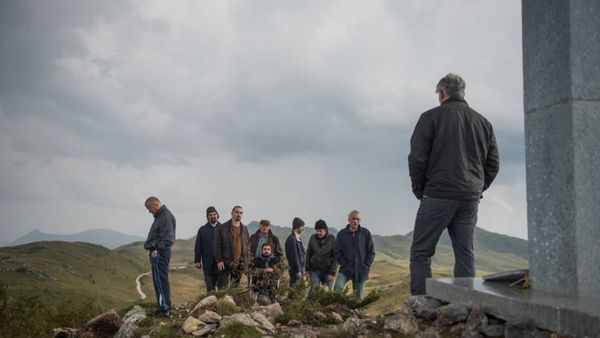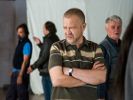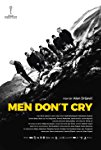Eye For Film >> Movies >> Men Don't Cry (2017) Film Review
Men Don't Cry
Reviewed by: Amber Wilkinson

The aftermath of conflict and the importance and difficulty of reconciliation between communities are explored in Alen Drljevik's tense and emotional drama. He goes further than simply considering the stain the Balkans conflict has left on the countries that have been founded since the break up of the former Yugoslavia, also considering the specific impact that cultural conditioning of men has on attempts at bridge building between communities. This means that despite its specific setting, it has a resonance that echoes anywhere in the world where sectarianism has brought conflict.
A sense of isolation is driven from the start by the setting, an out-of-season hotel half way up a mountain, where mist shrouds the trees. Almost two decades have passed since the fighting stopped but the men who have gathered at the hotel for what amounts to a week-long group therapy session have internalised the conflict, carrying it around with them physically and emotionally. Some injuries are more obvious than others - but is Jasmin (Boris Ler), who was still a teenager when he lost his legs in a war he was forced to fight in any more damaged than Ahmed (Ermin Bravo) who suffers personality problems thanks to the unseen pieces of shrapnel still lodged in his head?

There's a sense of limbo. We're between the seasons, cable cars hanging empty, but the men are equally stuck - coiled springs that one false word could set off. Erol Zubcevic's camera feels watchful, often looking not at who is speaking but at reactions to it. Althougheach of the men, including devout Muslim Merim (Emir Hadzihafizbegovic) and the taciturn Miki (Boris Isakovic) will have their moment in the spotlight, the scripting from Drlevik and Zoran Solumun feels organic, gently developing its themes and calling to mind documentaries like The Work - which shows a real-life variation on this group therapy idea.
The men, instructed by therapy leader Ivan (Sebastian Cavazza) - who begins the session by pointing out the atrocities on all sides - engage in role play, some more eagerly than others. As their stories begin to seep out, Drljevik also takes us into their off-hours. Situations that seem innocuous - a swimming session, a night with some illicit alcohol - are equally adept at showing the toxic masculinity, with aggression never seeming far away. There are also glimpses of other emotions, from regret and fear to camaraderie, all of which seem to be caught in a tempest within the men. This swirl of sentiment is a gift for the strong cast, who deserve an ensemble award for their work. Despite its strong themes, Drljevik also finds room for some dark humour - not least in initial therapy sessions where the men pretend to be animals.
There are a lot of characters, but they gradually flow together to build a fractured patchwork of what it means to be a veteran of messy conflict on any side. The wider community isn't let off the hook either, with Drlevik and Solumun exploring how society as a collective unit can drive individuals into these terrible positions in the first place and sometimes isolate them like pariahs once the deeds are done.There are no easy conclusions here and no easy fixes for the men - on of the marks of the film's complexity is that it finds time to acknowledge that therapy may not be the answer for some - but there is a sense that if nothing else, communicating across divides offers the best chance of hope in the long-term.
Reviewed on: 01 Apr 2018















